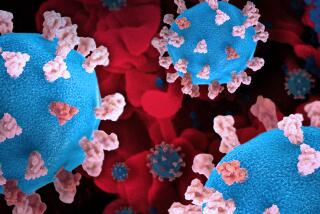San Diego researchers pursue potential cocaine overdose treatment
- Share via
Researchers at San Diego’s Scripps Research Institute have developed what they say could be the first effective treatment for cocaine overdoses. Their technique, which uses synthetically produced antibodies to bind cocaine and remove it from circulation, has so far been tried only in mice, but the team hopes to start human trials soon -- if they can produce enough of the antibodies in an economically viable manner.
Immunologists Jennifer B. Treweek and Kim D. Janda of Scripps have in the past been working on so-called active vaccine against cocaine and nicotine. Such active vaccines would stimulate the body to produce antibodies against the toxins, removing them from the bloodstream before they can reach their targets in the brain. Such vaccines would thus eliminate the pleasurable effects associated with cocaine use or smoking. The studies of these vaccines in rodents and humans have met with varying degrees of success, but one of the cocaine vaccines, called TA-CD, is now in phase 3 trials in humans.
There currently are no effective treatments for cocaine overdose, which can prove lethal. Two drugs, dexmedetomidine and rimcazole, have shown some benefit in mice but have not been tested in an organized fashion in humans.
Treweek and Janda reported in the journal Molecular Pharmaceutics that it may be possible to treat overdoses with a so-called passive vaccine. In contrast to an active vaccine, a passive vaccine involves injecting artificially produced antibodies into the patient. The researchers developed a human monoclonal antibody called GNCgzk that binds cocaine very tightly. They reported that the antibody produced a sharp reduction in rodent deaths when injected either prior to administration of cocaine or shortly afterward. Mice are considered an excellent experimental system for cocaine studies because they metabolize the drug in a fashion very similar to that of humans.
Amgen Inc. supplied the monoclonal antibody used in the studies. The research was funded by Scripps and the National Institute on Drug Abuse.
LATimesScience@gmail.com
Twitter: @LATMaugh






